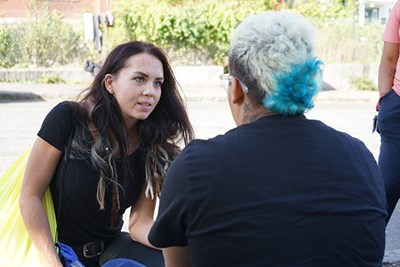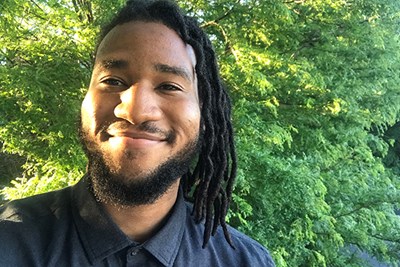UML Students Teach Older People, Immigrants Basic Computer Skills
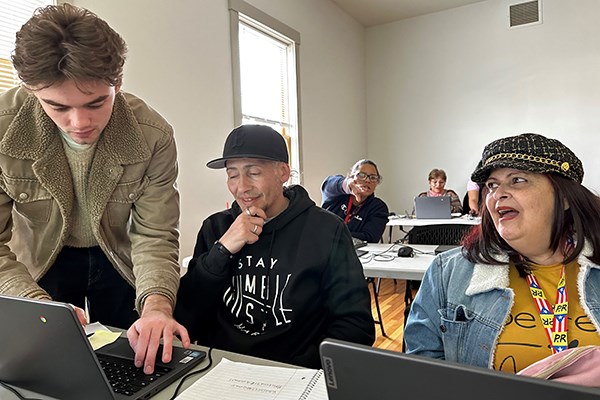 Image by K. Webster
Image by K. Webster
03/07/2024
By Katharine Webster
“I’m so happy to be here!” exclaims Nury Ortiz, during a 10-week class on basic computer skills taught by a pair of UMass Lowell students at the Coalition for a Better Acre.
Ortiz and her husband, Luis Tabares, who emigrated from Colombia to Lowell 25 years ago, are learning how to write emails, store their photos, set up Zoom meetings and more on Chromebooks, which feature a suite of free Google applications.
Senior electrical engineering majors Aidan Keefe and Jimmy Ryan lead the class and help individual students, with Spanish translation and more assistance from Dolores Sierra, the CBA’s community engagement and events coordinator. Keefe and Ryan also teach weekly digital literacy classes at the African Community Center of Lowell and the Haverhill Council on Aging.
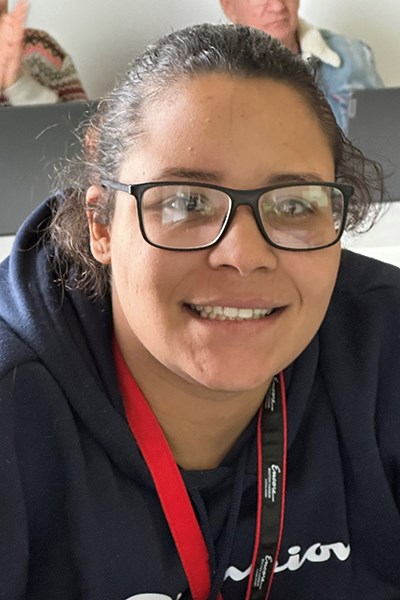 Image by K. Webster
Image by K. Webster
They are part of a group of UMass Lowell and Fitchburg State University students trained as “digital navigators” to teach the classes at nonprofits in Lowell, Fitchburg and Haverhill under a $4 million grant awarded to the university by the Massachusetts Broadband Institute.
The two-year grant, part of a state and national effort to bridge the digital divide, is led by Economics Prof. Carol McDonough, who researches technology use among older adults; Robin Toof, director of the Center for Community Research and Engagement; and Tom O’Donnell, UML’s senior director of innovation and workforce development.
Much of the funding will pay for the installation of a broadband network in one neighborhood in each city to which a few hundred low-income residents can connect at low or no cost, as well as some broadband access upgrades to public and community spaces.
Nationwide, people living in rural areas and tribal lands are the least likely to have broadband internet, but there are also pockets where access is lacking in Massachusetts, McDonough says. Some of these “digital deserts” are found in the poorest neighborhoods of the gateway cities, she says.
“Residents often don't have Internet access because they can’t afford it, and if they have access, they don't have the equipment.” McDonough says. “And if they have the equipment, they often don't have the knowledge to use it well.”
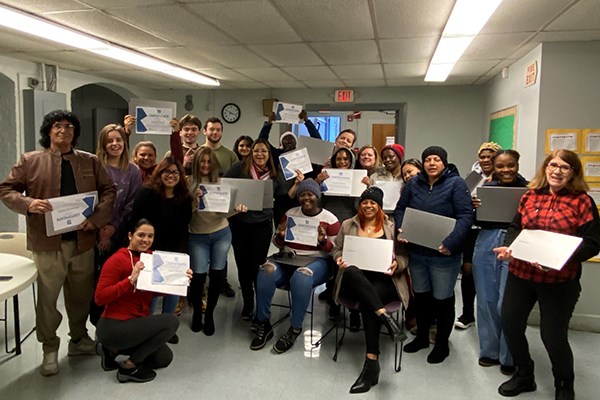 Image by Adriana Giraldo
Image by Adriana Giraldo
The UMass Lowell grant addresses those issues and more. O’Donnell, who came to the university with 25 years of high-tech industry experience, and Robert Skinnion, program manager for the grant, are working with government officials, nonprofits and internet service providers to figure out how best to deploy a small, hyperlocal broadband network in each city.
The “backbone” of each system will consist of a hardwired link to a networked group of wireless routers, to which individuals can also connect wirelessly, avoiding the cost of individual hardwired connections, O’Donnell says.
While building these mesh networks will take time, the digital literacy classes were piloted last fall in Lowell and Fitchburg, while Haverhill came online this semester with assistance from Toof, who serves as the main liaison to community organizations.
Biology Assoc. Teaching Prof. Johanna Choo designed the curriculum in nine modules and trained the UML students serving as digital navigators. Economics Assoc. Prof. Ben Li is doing pre-class and post-class surveys of the community students to see what they have learned.
And every community student who completes a class gets to take home a free Chromebook, thanks to the grant.
Many of the fall classes targeted older residents because, during the COVID-19 pandemic, their need for digital connections to friends, family, health care and other services became painfully clear, says Cecilia Gutierrez Yapur, director of programs at the CBA.
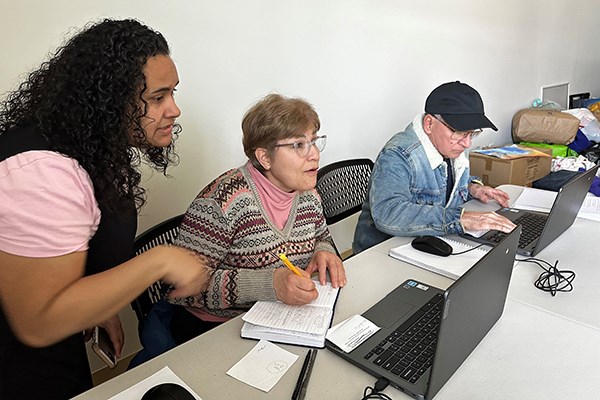 Image by K. Webster
Image by K. Webster
“Many of our seniors had been living their lives in person, and suddenly the whole world was digital,” she says. “Now, they can communicate with their children and grandchildren, make an appointment, have a Facebook account. You can see how happy they are.”
In Fitchburg, however, the Fitchburg State students first taught teens at the Youth Innovation Center, which is run by a nonprofit social service organization, Making Opportunity Count. The Fitchburg classes are being expanded to older residents this semester, while in Haverhill, older residents and people enrolled in a summer workforce development program are taking part.
The digital navigators have adapted the lessons to their community students in each setting. For example, the young people in Fitchburg already know some of the basics, while many of the new immigrants taking digital literacy lessons as part of the English for Speakers of Other Languages (ESOL) program at Lowell's Abisi Adult Education Center had never used a computer before.
“During the first ESOL class, we spent 45 minutes just teaching people how to open their laptops and sign in,” says Ryan, who co-taught the digital literacy lessons last fall at the Abisi Center with Keefe and junior criminal justice major Daniela Peña. “If Daniela wasn’t there, we would have been lost.”
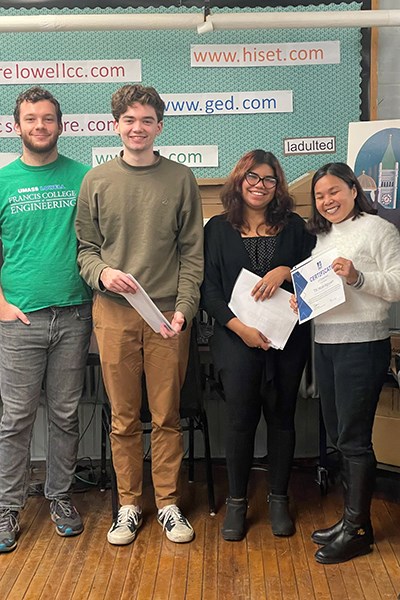 Image by Adriana Giraldo
Image by Adriana Giraldo
Peña, who grew up in the Dominican Republic, speaks Spanish fluently and understands some Portuguese. She is co-leading the digital literacy lessons within the ESOL program again this semester (as well as a stand-alone digital literacy class at the Lowell YWCA) with assistance from four other UML students, one of whom speaks Haitian Creole, as well as the Abisi Center’s two full-time English teachers. Last week, they spent the digital literacy sessions just going over the keyboard, she says.
“The English teachers are saints. I try to send them the lesson for that week ahead of time, and sometimes they talk to their students about it the day before,” she says. “And before I go to the ESOL center, I practice each module with my mom, because if she can understand it, then I know we can teach it.”
What do the UML students get out of it, besides a paycheck? Keefe says he plans to work as an engineer for a few years and then teach at the high school or college level, so he’s happy to get some classroom experience. Ryan says he’s developing his public speaking and presentation skills.
And all of them say that it’s gratifying to see a whole new world open up for their students.
“I look at them and I see people I know: my mom, my family, my community,” says Peña. “Many of them are coming to a country where the language they speak is not the main thing, and I can sympathize with that. So if I can make their lives a little better by teaching them something, then I'm happy to."

